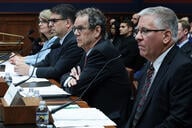You have /5 articles left.
Sign up for a free account or log in.
American graduate schools -- strong in developing specific skills in talented students -- must do more to inform students about career options and prepare graduates for non-academic workplaces, a new Council of Graduate Schools study suggests.
There were also plenty of encouraging findings. Most people with an advanced degree (85 percent) said their education opened up more career possibilities and 90 percent of current and former grad school students said they’d enroll in a master’s or doctoral program again.
Though thousands more future careers will require advanced degrees, and employers say they want to hire grad students, newly minted degree-holders often have trouble adjusting to a professional environment. Some companies complained that new hires struggled change one or the other of these "struggled/struggled", to avoid repetition? dl Agreed. Thanks for catching that. -MKS to give presentations, contribute to team projects or work on deadlines. Ron Townsend, who sat on the commission that developed this study, said that’s a common problem in his work at Battelle Memorial Institute and the U.S. Department of Energy's national laboratories. never seen this construction -- is this how he describes where he works? i would probably be inclined to lowercase national laboratories ... dl How about that? -MKS
“What many graduate [school] graduates "graduate graduates" is correct? inclined to make it "graduate [school] graduates"... dl Yeah. That was his quote, but I agree the brackets are an improvement. -MKS are missing is the ability to work to produce a specific outcome on a specific timeline under a specific budget,” he said. “That notion of working in a disciplined business environment, we typically have to teach graduates when they get to a laboratory.”
Among the study’s suggestions is that colleges offer more career counseling to grad students and that departments expose students to careers other than those in the college classroom. Pat Osmer, dean of Ohio State University’s graduate school, said that the singular focus on producing future faculty members is a problem in some disciplines.
“Doctoral education can no longer be about making clones of ourselves,” said Osmer, who chaired the study. “We have to look at making what’s needed for the 21st century.”
But the onus is not just on universities. Industry and government should expand their internship programs and develop more substantive relationships with graduate programs, the study says. Companies should also step up tuition reimbursement programs and grant employees time off to pursue advanced degrees.
Osmer said Ohio State has had success bringing in private sector executives to discuss the work their companies do. Often, he said, professors aren’t opposed to students pursuing non-academic careers but simply don’t have the experience to advise them about other options. by whom? the private sector executives, since the profs aren't knowledgeable? dl He meant professors. But I think it's confusing in this context so I just ditched the sentence. Let me know if you disagree. -MKS
The study doesn’t dwell on suggestions that some graduate programs might have too many students. Osmer agreed that’s a problem in some places, but said it’s best discussed discipline by discipline and department by department. Ohio State, which has produced 7,000 Ph.D.s since 2000 and has more than 100 graduate degree programs, is examining job placement information to see if overproduction of Ph.D.s. it's not clear what "that" means here ... overproduction of phds? or inadequate job placement? dl Agreed. -MKS is a problem on its campus.
The CGS study was developed on the premise that more jobs will require advanced degrees in coming years, but that many of those careers will be outside the academy. While doctoral programs have traditionally been seen as training for future professors, Osmer sees a broader application of the skills they develop.
“People are not so aware of opportunities outside the regular academic and research track,” he said. “A Ph.D. degree is about developing creative skills to identify new problems. This applies broadly and these kind of career approaches are clearly what we need going forward.”
Townsend agrees, citing engineering and business as fields where the private sector and colleges seem to be collaborating well and giving students a clear picture of their career prospects. That should be done more, he said, because America needs professionals with advanced degrees working both in and outside the academy.
“What’s the value of a Ph.D. in industry or a national laboratory?” Townsend said. “Ph.D.s. provide the scientific and technical leadership to drive scientific discovery, inspire innovation and solve the tough challenges.”
Among the study’s other findings:
- Some employers are wary of online graduate programs, suggesting the individual nature of those degrees makes students less prepared for collaborative work.
- Just about one-third of graduate students said they had adequate information about careers before enrolling.
- A majority of students cited personal enrichment, supplementing undergraduate work and fulfilling job requirements for a future career as reasons for pursuing graduate studies. (Students were allowed to choose more than one reason.)
- Seventy-three percent of students seek out career advice from graduate faculty.
- Though figures vary by field, around half of new doctoral degree recipients found initial employment outside the academy.




